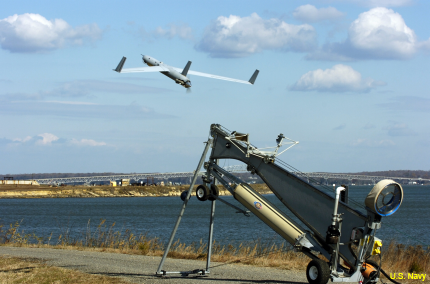U.S. sends drones to Africa for counterterrorism operations
The ScanEagle units being delivered to the Kenyan and Cameroonian militaries are part of an effort to share some of the military’s technological advantage with allies.

The catapult-launched ScanEagle is capable of maritime and land-based ISR.
The United States, which relied heavily on the use of unmanned aerial systems to conduct intelligence, surveillance and reconnaissance (ISR) while enjoying a relative monopoly on UAS, is expanding the number of partner countries it will loan drones to.
According to two recent announcements, the Navy will provide one ScanEagle UAS unit each, along with a 12-month Flight Hour Sustainment Package, to the Kenyan and Cameroonian militaries to aid in counterterrorism operations.
The ScanEagle, made by Insitu, a Boeing subsidiary, is a small UAS, with a wingspan of just over 10 feet, capable of maritime and land-based ISR. Each ScanEagle unit is made up of six medium-wave infrared vehicles. The sustainment package includes spares, training, technical manuals, a site survey, site activation team, field service representative support and force protection for the FSR team.
The shipments of ScanEagles are intended to help fill gaps in counterterrorism operations by Kenya and Cameroon, both of which are dealing with cross-border insurgencies. The United States has tried to partner with local forces to stem the tide of radical Islamic groups that tout anti-American and -Western views and want to carve out safe havens from which to govern under strict interpretations of Islam.
Larger UASs, such as the MQ-1 Predator and MQ-9 Reaper (both of which are capable of lethal payloads) fall under more stringent U.S. and international export controls, making U.S. sharing with partners more difficult, though not impossible. In fact, the State Department in February announced a new export policy for these larger systems. The most recent recipient of U.S.-made Reaper drones is Spain, which plans to use the aircraft for “homeland security, peacekeeping, peace enforcement, counterinsurgency and counter-terrorism operations,” Defense News reported. Secretary of Defense Ashton Carter recently concluded meetings in Spain with his counterpart.
Additionally, other nations such as France, the United Kingdom and Italy have operated Reaper drones, with the UK using them in coalition operations in the NATO International Security Assistance Force assistance in Afghanistan and most recently as part of the U.S.-led global anti-ISIS coalition, Operation Inherent Resolve.
However, some nations, such as Jordan, have requested unarmed Predator XP variants to assist in ISR operations as part of anti-ISIS operations. The U.S. has yet to provide these aircraft, over the vocal objections of some lawmakers and despite Jordan’s Major non-NATO Ally status—a designation that “among other things, makes Jordan eligible to receive excess U.S. defense articles, training, and equipment loans for cooperative research and development.”
The ScanEagle is easy to operate, described as a “small equipment footprint” that “does not require a runway for launch and recovery making it suitable for operations from unprepared terrain in forward deployed areas.”
The estimated cost for six-vehicle a ScanEagle unit is $10 million.
NEXT STORY: Wideband SATCOM terminals heading to sea




